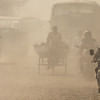Illegal brick kilns choking Bangladesh

If not for the devastating consequences, it's almost comical that the government, despite prohibiting the operation of illegal brick kilns, is failing to shut down these towering structures spread across the country. According to the Department of Environment (DoE), out of 7,086 kilns, 4,505 don't have environmental clearance, illustrating the authorities' sheer negligence. For years, we have been hearing about government measures to tackle pollution, but these steps have virtually become hearsay as we have seen no improvement in air quality. So, how many more years must we wait for actual change?
Despite DoE's efforts, brick kilns are mushrooming: in the last four years, almost 1,500 illegal kilns have been established. This implies that such efforts aren't bearing fruit. It has been repeatedly observed that when the department shuts a kiln down, the establishment resumes churning out bricks just days later. In numbers, out of nearly 1,000 shut kilns, 75 percent have resumed operation. And yet, our authorities have not changed their course of action.
As per our laws, no brick kiln can be established on slums, hills, forests, wetlands, and farmlands. But most of these structures are violating the rules. This inaction is allowing the kilns to envelop Bangladesh in smoke, taking air pollution to new heights. According to the World Bank, one of the major sources of air pollution in greater Dhaka is brick kilns. Let's not forget the dire impacts: air pollution is taking 6.8 years of life expectancy from citizens, while more than 175,000 Bangladeshis succumbed to it in 2019. Besides, kilns are permanently damaging the country's soil, putting our farmers in a crisis.
So, what can we do to divert from this path of environmental devastation? As we have seen, surface-level measures will not work. It is widely known that illegal kilns operate under the patronage of local politicians and influentials. Therefore, it's imperative for the authorities to tackle offenders behind the scenes. Besides, authorities must ensure alternatives for the long term, such as environment-friendly concrete blocks, which currently just meet five percent of construction needs. For our country to be free from pollution, the plague of illegal brick kilns must be eliminated.


 For all latest news, follow The Daily Star's Google News channel.
For all latest news, follow The Daily Star's Google News channel. 









Comments